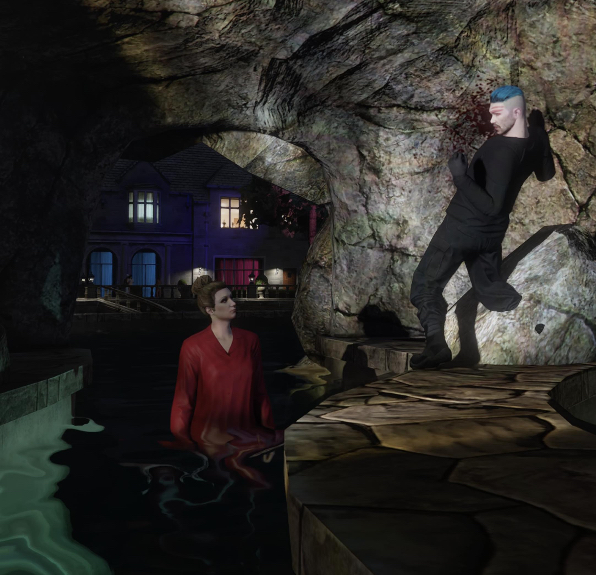The intersection of traditional art forms and modern technology has long been a fertile ground for creativity and innovation. Yet rarely has this mixup produced something as simultaneously absurd and intriguing as Grand Theft Hamlet. Directed by Sam Crane and Pinny Grylls, the documentary chronicles an ambitious attempt to stage a production of William Shakespeare’s Hamlet within the sprawling, chaotic world of Grand Theft Auto Online. While the premise might initially strike some as ludicrous, the project has been met with critical acclaim, winning the Jury Award for Best Documentary Feature at the 2024 SXSW Film Festival and earning an impressive 95% rating on Rotten Tomatoes.
As the film releases in U.S. theaters on Friday, January 17th, audiences are poised to experience a unique exploration of Shakespearean drama in an unexpected setting. This essay examines the film’s premise, execution, and broader cultural significance.
A Concept That Pushes Boundaries
At first glance, the idea of staging a production of Hamlet in Grand Theft Auto Online might seem incompatible. Hamlet, one of Shakespeare’s most celebrated tragedies, is a deeply introspective exploration of themes like revenge, mortality, and existential despair. Meanwhile, Grand Theft Auto Online (GTAO), part of the Grand Theft Auto V franchise, is notorious for its satirical take on American culture, chaotic gameplay, and a player base often characterized by their irreverent approach to the game’s mechanics.
Yet it is precisely this dichotomy that makes Grand Theft Hamlet so compelling. The documentary’s hook lies not only in the audacity of its concept but also in the creative challenges it poses. How does one capture the emotional depth of Hamlet when the medium involves avatars with limited facial expressions, voice chat laced with latency, and a digital environment designed for mayhem rather than introspection?
Crane and Grylls embrace these limitations, using them as a springboard for innovation. By juxtaposing the high art of Shakespeare with the anarchic energy of GTA Online, they create a space where old and new, serious and absurd, collide in ways that force viewers to reconsider the boundaries of performance and storytelling.
The Process: From Concept to Execution
The documentary provides a behind-the-scenes look at the herculean effort required to bring Hamlet to life in a digital world. It begins with the casting process, which in itself is a microcosm of GTA Online’s chaotic culture. Actors from around the world audition for roles not in a physical theater but within the game, each bringing their own avatars, voices, and interpretations of the text.
One of the film’s most poignant moments involves the casting of Hamlet himself. The chosen actor, a young English literature student named Marcus, uses the game as an escape from his isolating real-world circumstances. His performance, mediated through a blocky avatar in a virtual environment, serves as a reminder of the human capacity to adapt and connect, even in unconventional spaces.
Rehearsals prove equally challenging. Unlike a traditional stage production, the cast and crew must contend with technical glitches, griefers (players who disrupt gameplay), and the inherent limitations of the game engine. Yet these obstacles are also a source of humor and ingenuity. A particularly memorable scene in the documentary shows the director coaching actors on how to mime sword fights using the game’s limited animations, turning what could have been a shortcoming into a unique stylistic choice.
Themes and Subtext
Beyond the novelty of its premise, Grand Theft Hamlet is rich with thematic depth. At its core, the film is a meditation on adaptation and reinvention. Shakespeare’s works have endured for over four centuries precisely because they are malleable, capable of being reinterpreted across cultures, time periods, and mediums. By bringing Hamlet into the world of GTA Online, Crane and Grylls are participating in this long tradition of reinterpretation, proving that even a virtual landscape dominated by car chases and shootouts can serve as a stage for timeless human drama.
The film also explores the democratization of art in the digital age. GTA Online, like other virtual platforms, allows users to create and share content on an unprecedented scale. By staging Hamlet in this space, the directors make Shakespeare accessible to a global audience that might otherwise have little exposure to the Bard. Players who stumble upon the production in-game may find themselves drawn into the story, engaging with the text in ways they never expected.
Finally, Grand Theft Hamlet is a commentary on the blurred lines between reality and virtuality. The actors bring their real-world emotions and experiences into the game, while the virtual setting inevitably influences their performances. This interplay raises questions about authenticity and performance: When does the virtual become real? Can an avatar in a game convey the same depth of emotion as a live actor on a stage?
Critical Reception and Impact
Since its debut, Grand Theft Hamlet has been met with near-universal acclaim. Critics have praised the film for its originality, humor, and emotional resonance. Writing for The Guardian, one reviewer described it as “a riotously inventive celebration of the human need to tell stories, no matter the medium.” Another critic, from The Hollywood Reporter, highlighted the film’s ability to “find profound beauty in the unlikeliest of places.”
The documentary’s success also reflects a growing acceptance of video games as legitimate artistic mediums. While debates about the cultural value of video games have persisted for decades, Grand Theft Hamlet serves as a powerful argument for their potential as platforms for creativity and storytelling.
Moreover, the film has sparked conversations about the future of theater and performance. In an era when live theater faces challenges ranging from declining attendance to the logistical hurdles of the COVID-19 pandemic, virtual spaces offer new possibilities for reaching audiences. Grand Theft Hamlet is not just a one-off experiment but a potential blueprint for how traditional art forms can evolve in the digital age.
Challenges and Controversies
Despite its acclaim, Grand Theft Hamlet has not been without its detractors. Some purists argue that Shakespeare’s works lose their gravitas when performed in a setting as irreverent as GTA Online. Others question whether the documentary’s emphasis on the novelty of its concept overshadows the substance of the play itself.
The film also raises ethical questions about the use of commercial gaming platforms for artistic purposes. While GTA Online provided the infrastructure for the production, it is ultimately a corporate product designed to generate revenue. Critics have expressed concern about the implications of creating art within spaces controlled by profit-driven entities, particularly when those spaces have a history of fostering toxic behavior.
Nonetheless, these critiques have done little to diminish the film’s impact. If anything, they highlight the complex, multifaceted nature of the project, which invites debate and discussion from a wide range of perspectives.
Final Thoughts
Grand Theft Hamlet is more than just a documentary about staging a Shakespearean play in a video game; it is a bold experiment that challenges our notions of art, performance, and storytelling. By bringing Hamlet into the digital realm of GTA Online, Sam Crane and Pinny Grylls have created a work that is at once absurd, profound, and deeply human.
As the film makes its theatrical debut, it invites audiences to reflect on the ways in which technology can reshape our relationship with art and culture. Whether you are a fan of Shakespeare, a gamer, or simply someone curious about the creative possibilities of the digital age, Grand Theft Hamlet offers an experience that is as thought-provoking as it is entertaining.
In a world where the boundaries between the virtual and the real continue to blur, Grand Theft Hamlet reminds us that storytelling remains a vital, unifying force—one that can transcend even the most unlikely of settings.
No comments yet.








